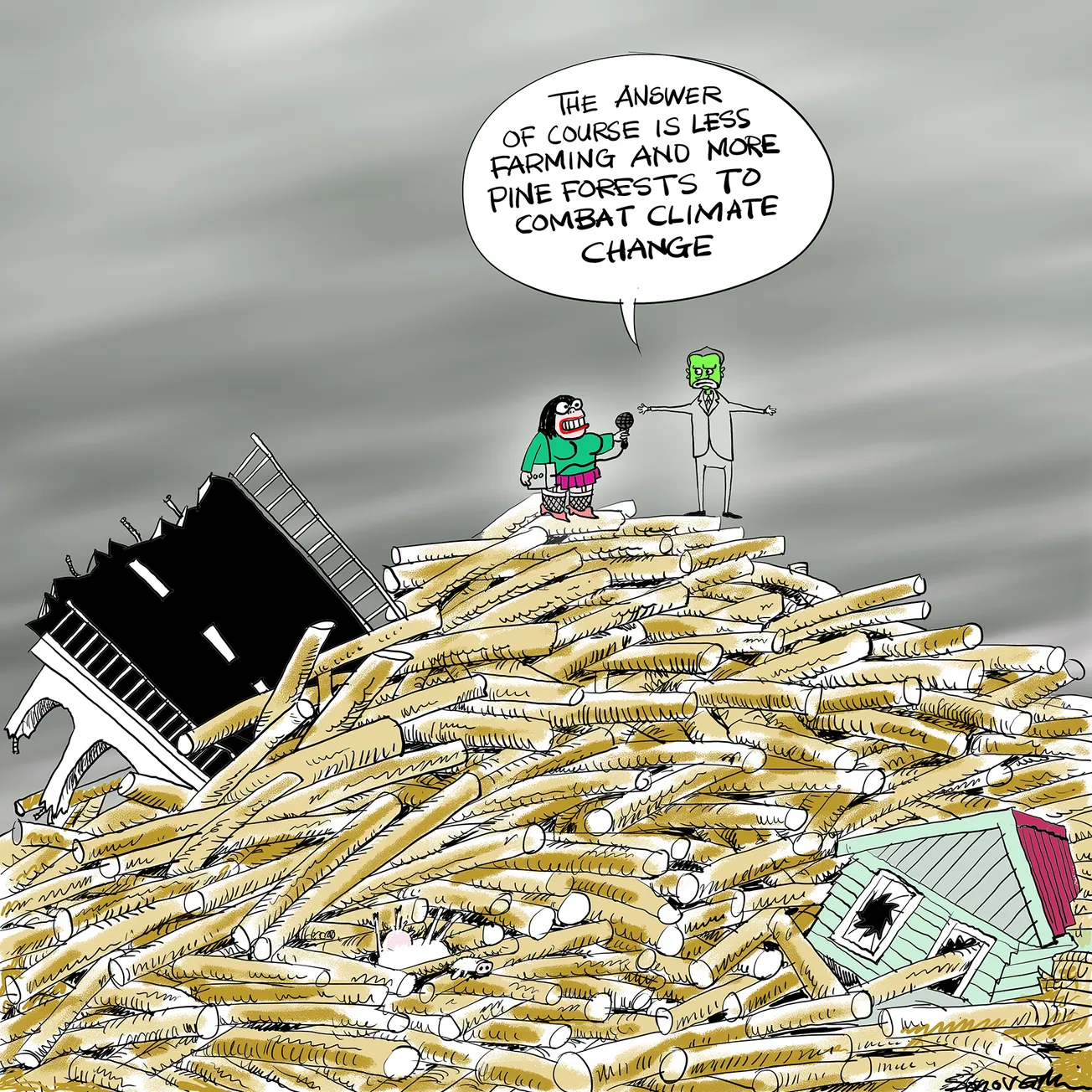Table of Contents
Graham Adams
Graham Adams is a freelance editor, journalist and columnist. He lives on Auckland’s North Shore.
This column was first published at The Common Room, commonroomnz.com
Who would have thought a very ill wind would blow the Greens no good? After devastating floods in January and Cyclone Gabrielle in February, it really should have been the Greens’ moment in the sun. Their apocalyptic predictions about the climate appeared to have been fulfilled.
Instead, they have been entirely backfooted. The damage wreaked by the weather is widely viewed not as a compelling reason to double down on efforts to mitigate greenhouse gas emissions but to push forcefully for adaptation to cope with future weather-related disasters.
On TVNZ’s Breakfast last week, Green MP Chlöe Swarbrick looked agitated as she argued that New Zealand needed “radical transformation” to ward off the “extreme weather events” caused by putting “climate-changing emissions into our atmosphere”.
In contrast, Act’s preternaturally calm Brooke van Velden made a pitch for more money to be spent on adaptation: “When I look ahead, I don’t want to see us having a conversation [like], ‘Well everything’s to do with climate change and it means we have to mitigate and cut farmers’ number of cows, and we have to subsidise Tesla owners against ute owners’… I think we need to look at how do we actually adapt to climate change? That’s through more money being spent on good infrastructure.”
Swarbrick responded with what — in the aftermath of a deadly and devastating storm — can only be described as a jaw-dropper: “This is not a recovery and rebuild moment! This is a ‘Don’t Look Up’ moment. This is what we mean when we talk about the climate emergency.”
“Don’t Look Up” was a reference to the 2021 black comedy that Netflix summarised as: “Two astronomers go on a media tour to warn humankind of a planet-killing comet hurtling toward Earth. The response from a distracted world: Meh.”
It’s certainly difficult to imagine anyone who is digging silt out of their homes or repairing ruined fences taking any notice of Swarbrick’s tin-eared warning about greenhouse gases.
Unfortunately for the Greens, who have staked their political careers on redirecting farming practice to reduce emissions, alongside remodelling urban areas so that people use public transport more and walk and cycle instead of driving, influential commentators on both the left and right have declared that adaptation will be the only viable political strategy this election year.
Left-wing commentator Chris Trotter wrote:
“It is only slowly dawning on climate-change activists that the fight against global warming is lost… The idea of mitigating a weather event as destructive as Gabrielle will strike most people as nuts. If this is what global warming looks like, then most New Zealanders will want their government to help them adapt to it as soon as humanly possible. Increasingly, politicians and activists who bang on about reducing emissions and modifying human behaviour will be laughed off the political stage. It will be the parties that offer the most practical and responsibly funded adaptation policies that will win the elections of the future — including the one scheduled for October 14, 2023.”
On the right, Matthew Hooton declared:
“New Zealand’s era of climate-change mitigation, which began with National signing the 1992 Rio Declaration and the 1997 Kyoto Protocol, is over. The physical and political effects of Cyclone Gabrielle mean the era of adaptation has begun.”
Speaking to host Jack Tame on Q&A in the weekend, Greens co-leader James Shaw was obliged to admit that in his five-and-a-half years as Climate Change Minister, there had been very little progress, if any, in reducing New Zealand’s emissions.
Asked what he had achieved in that time, Shaw replied:
“We have started the process by which our emissions will come down, year after year.”
Tame brutally translated that statement to mean:
“We have created frameworks for future governments to have to make tough decisions.”
When Tame asked him why he hadn’t resigned since he had accomplished so little, Shaw said he saw the lack of progress as “a reason to double down, not to give up”.
He asserted defiantly, and more than a little hopelessly: “Jack, I am never going to give up. It’s too important.”
As it turns out, the Greens are not the only party to have been mugged by political reality in the weeks since Cyclone Gabrielle struck. On Monday morning, the New Zealand Herald’s Thomas Coughlan relayed information he had obtained through an OIA request about the government’s draft plan for transport. Known as the Government Policy Statement on Land Transport (or GPS), the plan sets strategy for how the tens of billions of dollars mostly collected from fuel taxes and road-user charges will be spent over the next ten years. It is updated every three years.
A briefing Transport Minister Michael Wood had sent to councils proposed that, for the first time, emissions reduction would take pride of place. As an example, Wood suggested the $2 billion earmarked for spending on road maintenance in 2024 could also be used to snaffle space for busways, walkways and separated e-scooter lanes. Coughlan described it as a “stark pivot towards public transport and away from emissions-intensive investments, like new highways”.
At 7 am on Monday, Wood was defending the plan’s “overarching aim” of reducing emissions to Mike Hosking on Newstalk ZB.
By mid-afternoon that day — after a burst of public outrage and criticism by Opposition politicians — he had performed a screeching u-turn that would have made a boy-racer’s heart pulse with pride. Suddenly, it was much more important to urgently repair the extensive damage to the nation’s roading system than it was to reduce emissions.
Wood:
“The indicative transport priorities signed off by Cabinet last year will change in the wake of Cyclone Gabrielle. We are now working on an emergency-style GPS that will focus on the huge task of reconstruction of roads and bridges washed out by the cyclone and flooding, as well as building greater resilience so our transport network can better withstand the increasing frequency of extreme weather events like we have seen this year.”
When Chris Hipkins was asked at Monday’s 4 pm post-Cabinet press conference, “Is climate change going to be front and centre in your transport planning and building?”, the Prime Minister replied: “It’ll still be in there but, as I’ve said, resilience is going to be right at the top of the priority list.”
Labour can probably get away with this spectacularly abrupt change of heart. After all, its campaign slogan in the wake of Hipkins’ baptism as leader in January could well be the biblical promise: “Old things are passed away; behold, all things are become new.” Sometimes, it seems, within the space of a few hours.
The Greens don’t enjoy the same luxury as Labour of chopping and changing major environmental policy and jettisoning it at will. Combating emissions and climate change is pretty much their raison d’être. As former Act leader Richard Prebble noted this week: “After nearly six years, James Shaw, the Minister of Climate Change, is yet to produce an adaptation plan.”
On Breakfast, Swarbrick appeared defeated when she said: “I’ve spent five years trying to figure out how to calmly and rationally talk about this climate emergency.”
Pinned against the ropes, the Greens have now — in what looks like desperation — expanded the definition of “climate denier” to include anyone who doesn’t want to act as urgently to reduce emissions as they recommend. As Swarbrick tweeted: “Climate action delay is the new denial. There is no runway left for political inertia.”
Last week on Twitter, James Shaw — while offering advice on how to deal with “the late-stage, climate-change deniers in your life” — described what he called the “Four Stages of Climate Denial”.
- Climate change isn’t real
- If it is real, it isn’t us
- If it is us, it’s not that bad
- If it is that bad, it’s too late to do anything about it.
Climate change *is* real.
It *is* us.
It *is* bad.
And we *can* fix it.
Shaw might find more peace of mind, however, if — instead of kicking against the pricks and trying to denounce a chunk of the voting public as deniers — he studied Elisabeth Kübler-Ross’s Five Stages of Grief.
Fifty years ago, the Swiss psychiatrist outlined the now-famous stages of denial, anger, bargaining, depression and acceptance to describe how people cope with illness and dying. Since then the stages have been used to describe everything from divorce and drug rehab to political upheavals — such as the profound grief experienced by many Democratic Party supporters after Trump won in 2016.
Right now the Greens — and many of their supporters in the media — seem to be mired in denial and anger as the political ground shifts sharply beneath them.
The stages of bargaining, depression and acceptance are yet to come.









